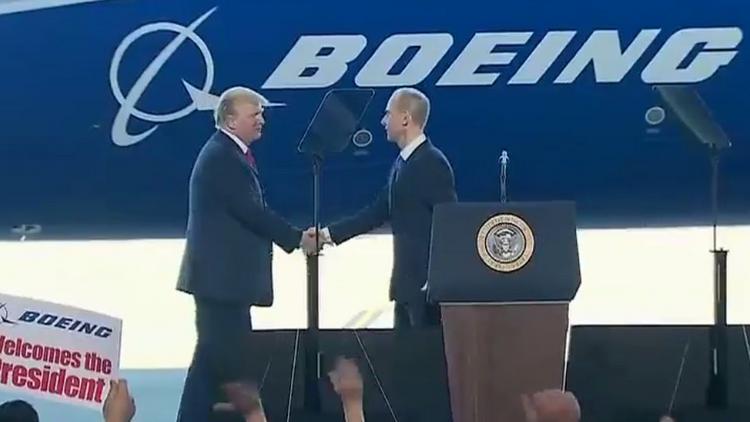The
FAA Let Boeing Certify the Safety of Its Own Planes
By Terry H. Schwadron, DCReport New
York Editor
| For more cartoons by Ted Rall, CLICK HERE. |
Indeed, the United States was the last to declare emergency grounding.
Did our FAA have some special knowledge here that other
international agencies do not? Or was this lack of action the result of
protectionist action for American business or political power? Was it the FAA
or the president who delayed? And how, after all, is this looking out for the
best safety interests of Americans?
There have been hints, but no specific reporting I’ve seen on
the question. So, I was attracted by the New York Times Op-Ed column by James
E. Hall, former chairman of the National Transportation Safety Board, which
looks into such accidents as we have seen with this aircraft, who lays the blame at regulatory
changes.
“The roots of this crisis can be found in a major change
that the FAA instituted in its regulatory responsibility in 2005. Rather
than naming and supervising its own ‘designated airworthiness
representatives,’ the agency decided to allow Boeing and other manufacturers
who qualified under the revised procedures to select their own employees to
certify the safety of their aircraft. In justifying this change, the agency
said at the time that it would save the aviation industry about $25 billion
from 2006 to 2015. Therefore, the manufacturer is providing safety oversight of
itself. This is a worrying move toward industry self-certification.”
Thus, the decisions about the safety of these new-model
planes—crashes of which have killed all 189 and 157 aboard two recent
international flights under similar circumstances—apparently are in the hands
of Boeing itself.
And yes, Boeing’s CEO, Dennis Muilenburg, is a personal friend
of Donald Trump, owner of the Trump Special from Boeing, an air flight
enthusiast, and frequent promoter in international talks.
Muilenburg apparently told Trump that there was no reason yet to ground the plane—so we didn’t.
Muilenburg apparently told Trump that there was no reason yet to ground the plane—so we didn’t.
Indeed, pilots who met with Boeing to
complain about the plane’s software last fall say they were told that the manufacturer
would upgrade computers by the end of 2018. Nothing happened, they said,
including no additional training information.
Former NTSB chair Hall noted that President Trump’s executive
order on Wednesday afternoon to ground all Boeing 737 Max 8s was necessary but
that it should have come from the FAA rather than the White House.
As he outlined, before this policy was instituted, the FAA
selected these airworthiness representatives, who may have worked for the
manufacturer but were chosen and supervised by the agency. These experts were
responsible for guiding the agency’s decisions about whether to ground an
aircraft for safety concerns. Necessarily, grounding plans is rare.
This Trump administration has declared its love and belief in
deregulation, an insistence that problems meant to be addressed by the red tape
of bureaucracy just would not exist if we did not make business spend time
defending themselves. The more we learn about these Boeing Max plane accidents,
the more that notion seems adrift.
Most accidents today do not result from systematic aircraft
flaws that would justify grounding an entire fleet. Hall recommended grounding
an airliner model only once in my seven years as chairman of the National
Transportation Safety Board, following a commuter airliner crash in Indiana.
Since this new “regulatory” scheme took effect, Hall recounted,
the aviation industry has introduced two new aircraft types, both of which have
encountered serious problems.
In 2013, Boeing’s 787 Dreamliner was grounded because of fires caused by lithium batteries. In that case, the agency quickly recertified the safety of the aircraft, even before the exact cause of the Dreamliner problems had been determined.
And now, we have the troubled flight management systems of the 737 Max 8, which made its first commercial flight in May 2017. In this case, there have been two catastrophic accidents within five months of each other, involving a relatively new model of aircraft. Boeing itself acknowledges that it is developing a revision to its flight management system.
In 2013, Boeing’s 787 Dreamliner was grounded because of fires caused by lithium batteries. In that case, the agency quickly recertified the safety of the aircraft, even before the exact cause of the Dreamliner problems had been determined.
And now, we have the troubled flight management systems of the 737 Max 8, which made its first commercial flight in May 2017. In this case, there have been two catastrophic accidents within five months of each other, involving a relatively new model of aircraft. Boeing itself acknowledges that it is developing a revision to its flight management system.
In the end, Hall argues, grounding this aircraft was the right
thing to do. It will allow regulators and Boeing’s engineers to determine what
exactly caused this crash.
But he warns, the problems of the 737’s latest model, the Max 8, show that those responsible for ensuring the safety of our skies have strayed from this successful path, and lives have been unnecessarily placed at risk.
The FAA’s oversight of aircraft safety needs to be examined by Congress, which should act to make sure the agency names independent experts to determine the airworthiness of an aircraft.
But he warns, the problems of the 737’s latest model, the Max 8, show that those responsible for ensuring the safety of our skies have strayed from this successful path, and lives have been unnecessarily placed at risk.
The FAA’s oversight of aircraft safety needs to be examined by Congress, which should act to make sure the agency names independent experts to determine the airworthiness of an aircraft.
The president is quick to say he is acting first on behalf of
the safety of the American people. I guess that is, unless it interferes with
American business.
